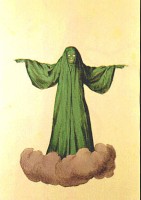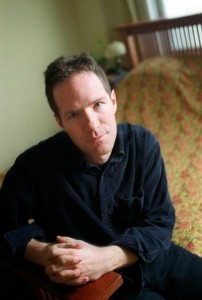Choice Gleanings from the NYT Weekend Book Review
Rick Moody reviews Mick Wall’s biography of Led Zeppelin, and finds it overly focused on prurient groupie-stories, at the expense of any real discussion of the band’s music. This is the same Mick Wall, then of Kerrang! called out by name (along with Bob Guccione Jr., then of Spin, Andy Secher, then of Hit Parader, and the entire entity that is/was Circus Magazine) in the song “Get in the Ring” on Use Your Illusion II. (“You be rippin’ off the fuckin’ kids/ While they be payin’ their hard earned money to read about the bands They want to know about / Printin’ lies startin’ controversy / You wanta antagonize me / Antagonize me motherfucker / Get in the ring motherfucker…”) Guess things haven’t changed much for ole Mick over the years.
Sheila Kohler (alumna of The Quarterly and a Lish-era Knopf) has a new novel, a work of historical imagination entitled Becoming Jane Eyre, which Christopher Benfey seems to have enjoyed.
Christopher Byrd, a rad younger critic, whose unexpected popping-up here seems like a general omen of good tidings, reviews Running Away by Jean-Phillipe Toussaint.
And Patrick Cockburn–intrepid journalist, and brother of Alexander–greatly admires Joe Sacco’s Footnotes in Gaza, a new work of graphic historical-journalism depicting two long-forgotten massacres of Palestinians.
[E]arly in 1956, the Israeli chief of staff Moshe Dayan made a famous speech at the funeral of an Israeli commander killed on the border with Gaza. What, Dayan wondered, explained the Palestinians’ “terrible hatred of us”? Then he answered his own question: “For eight years now they have sat in the refugee camps of Gaza, and have watched how, before their very eyes, we have turned their lands and villages, where they and their forefathers previously dwelled, into our home.”
Oh right, that.
December 26th, 2009 / 11:24 pm
Some Reactions to “Some Contemporary Characters” by Rick Moody
All of you know that Electric Literature recently began tweeting what they are calling ‘an experiment in participatory ePublishing’: they are publishing Rick Moody’s story “Some Contemporary Characters” over three days/153 Tweets. They’ve invited anyone who’d like to RT ((re)publish?) the story along with them to participate. As far as I can tell, here’s who is participating: @WritersGarret, @vromans, @shyascanlon, @TheSchooner, @str1cken, @StephenBruckert, @skylightbooks, @skemptastic, @OpiumMagazine, @MWSchmutterer, @litdeathmatch, @FictionAdvocate, @coppernickel, @commongoodbooks, @breathebooks, @brazosbookstore, @blackclockmag, @a_m_kelly, @Andrew_Ervin, @lunaparkreview, @BOMBMagazine, and probably more.
After tweeting the story for today, Electric Literature posted this question on their Facebook page: “Is the Multiple Tweeting of Rick Moody’s Story Awesome, Annoying, or a Bit of Both?”
After the jump, I’ve tried to answer the question as best I could.
READ MORE >
Vicarious MFA: Home stretch

The Vicarious MFA!
Informal survey: Are writers with MFA’s the only writers who give a damn what people in other MFA programs are reading? If so, thanks to all you non/anti-MFA HTML giant readers who put up with the all this MFA chatter. Here is your last dose of Vicarious MFA hoo-hah.

+ Surprise guest class with Richard Ford!
Before the class, everyone who signed up for it read Indian Uprising by Donald Barthelme, Louis Menand’s New Yorker article about Barthelme , and an interview with Umberto Eco. Richard Ford talked about Barthelme for a little while and we asked him a lot of questions about his writing process, philosophy and ideas about the collage element that is innate in all forms/types of writing. He brought his “notebook” to class, which, in fact, was not a notebook at all. It was a huge, purple, three-ring binder in which he collects quotes, thoughts, facts, research, etc for whatever novel he’s working on at the time. He told us about how he’s dyslexic and how that effects his writing. At one point Ford said, “Rick Moody, who I deeply disrespect, once said something about how there are only two kinds of writers: writers like Hemingway and writers like Beckett. I disagree with that… It’s too narrow a perspective on what a writer can be…Writing is supposed to broaden your world, open things up… Rick is probably a nice boy, he just says silly things.” I got to chat with Ford for a moment afterwards, just to say thanks and hello. I was excited about this because we are both from Mississippi and we’ve both lived in New Orleans, which is the nearest refuge for people born in Mississippi. We talked about New Orleans for a minute, how easy it is to get nostalgic about New Orleans and how we both want to buy houses there.
More Highlights:
+Amy Benson made strawberry-rhubarb pound cake for our last meeting of Non/Fiction. I turned in a monster crazy-weird essay that I will be excited to get her feedback on.
+Last workshop is kicked off with a few bottles of champagne, which went straight to everyones’ heads, loosening a hysteria of honesty. It was a good group, but I will be happy not to have to read anyone else’s first drafts for a while.
I like Rick Moody a lot, wanna fight?
 Rick Moody, along with David Foster Wallace, was one of the big reasons I started writing fiction. The first book of his that I read was ‘Purple America.’ The opening pages of ‘Purple America’ are a man describing his mother’s failing body and the methods he employs to care for it in mostly one long run on sentence, post-Ginsberg ‘Kaddish’ style, and it is among the most beautiful openings of a book I can remember. This is an excerpt of the sentence:
Rick Moody, along with David Foster Wallace, was one of the big reasons I started writing fiction. The first book of his that I read was ‘Purple America.’ The opening pages of ‘Purple America’ are a man describing his mother’s failing body and the methods he employs to care for it in mostly one long run on sentence, post-Ginsberg ‘Kaddish’ style, and it is among the most beautiful openings of a book I can remember. This is an excerpt of the sentence:
“whosoever slips his mother’s panties up her legs and checks the dainty hairless passage into her vulva one more time, because he can’t resist the opportunity here for knowledge, whosoever gags briefly at his own forwardness, whosoever straps his mother’s bra onto her, though the value of a bra for her is negligible, whosoever slips a housedress over her head, getting first one arm and then the other tangled in the neck hole,”
etc etc. I realize more and more looking back how much I learned from Moody’s poetic listmaking devices and explorative thinking set in prose in the same way that I learned from DFW, but differently. Moody is a different beast, more florid in a certain way and more in a poetic mode, but the way he constructs these monsters of increasing awareness and tenor, I don’t know, they definitely have been important to me.
